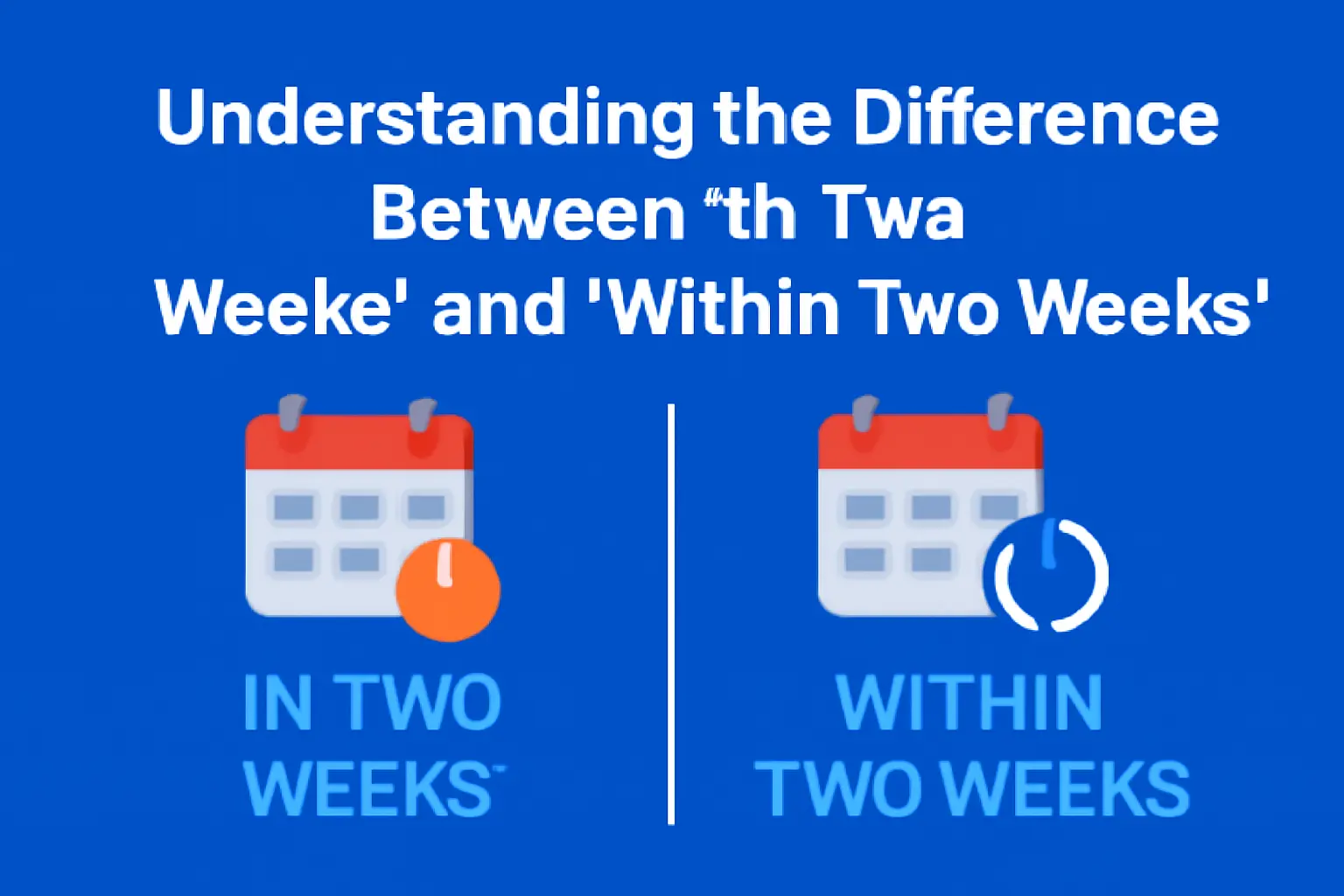The English language can sometimes be tricky, especially when it comes to using time expressions. One of the more subtle distinctions involves the phrases "in two weeks" and "within two weeks." While they may seem similar at first glance, there is a key difference in their meaning and usage. Understanding the distinction between these two phrases will help you communicate more clearly and precisely, especially when discussing deadlines, time frames, or appointments.
In this article, we will explore both phrases, break down their meanings, provide examples of usage, and offer tips for mastering these time expressions in everyday conversations.
"In Two Weeks": A Precise, Fixed Point in the Future
The phrase "in two weeks" refers to a specific point of time that will occur two weeks from the present moment. It gives a sense of certainty, and the event or action will happen exactly two weeks later. This phrase implies that the action or event is scheduled or anticipated to take place at a precise moment in the future.
Examples of "In Two Weeks":
We are leaving for vacation in two weeks.
The project deadline is in two weeks.
The concert is in two weeks.
In these examples, the events are clearly set to occur exactly 14 days from today. There is no room for flexibility regarding when the events will take place—they are fixed for that particular time.
When you say something is happening "2 weeks from today," it communicates the same sense of a set time frame—exactly two weeks later, with no variation.
Trending Article: Towing Companies
Clarifying the Usage:
Precise Point in the Future: "In two weeks" is commonly used to set a date that will happen exactly two weeks from today.
No Flexibility: The phrase does not imply that the event can happen at any time within the next two weeks, only that it will occur specifically two weeks later.
For instance, when a meeting is set to happen 2 weeks from today, you can expect the event to occur exactly on that day, two weeks later, with no changes.
"Within Two Weeks": A Flexible Time Frame
In contrast, "within two weeks" introduces a certain level of flexibility. This phrase indicates that the event or action will take place sometime before the two-week period ends but not necessarily on the exact 14-day mark. The event can happen at any point during the two-week span, which means there is a range of possible times within which the action or event may occur.
Examples of "Within Two Weeks":
I will submit the report within two weeks.
You should receive the package within two weeks.
The meeting will be scheduled within two weeks.
In these cases, the event or action could happen anytime during the next 14 days. The exact timing is not fixed; what’s important is that the action will take place at some point before the two-week period is over.
When you use the phrase "2 weeks from today," you're talking about a specific point in time, while "within two weeks" suggests flexibility in the timing but still implies the event will occur before that two-week period expires.
Clarifying the Usage:
Flexible Timing: "Within two weeks" allows for a broader time frame and does not specify an exact moment.
Deadline or Expected Period: The phrase implies that the action or event will occur at some point before the two-week period concludes, providing more flexibility than "in two weeks."
Key Differences: A Quick Comparison
While both phrases are used to describe events in the future, their meanings differ in terms of specificity and flexibility. Here's a quick comparison of the two:
| Feature | In Two Weeks | Within Two Weeks |
| Meaning | Occurs exactly two weeks from today. | Occurs at any point during the two-week period. |
| Flexibility | No flexibility – it’s a specific time. | Offers flexibility within the two-week time frame. |
| Usage | Used for precise events scheduled exactly in the future. | Used for actions or events that will happen at some point within the time frame. |
| Examples | "The event is in two weeks." | "The report is due within two weeks." |
Business and Professional Contexts
In the business world, deadlines and appointments often need to be clearly defined. Whether you're dealing with clients, coworkers, or supervisors, understanding the difference between these two time expressions is crucial to avoiding misunderstandings.
"In two weeks": If your boss tells you, "We need the report in two weeks," you know exactly when the report is due—14 days from today.
"Within two weeks": If your boss says, "The report should be submitted within two weeks," you have some leeway to submit it anytime before the two-week period is over.
In a professional setting, clarity is key. Therefore, choosing between these two phrases can make a significant difference in how expectations are set.
Everyday Conversations
The distinction between "in two weeks" and "within two weeks" also applies in casual conversations. For example:
"In two weeks": "We’re having a barbecue in two weeks!"
"Within two weeks": "I’ll get the tickets to you within two weeks."
In both cases, you’re talking about future events, but the second example provides some flexibility in timing.
Travel and Appointments
"In two weeks": "My flight is in two weeks."
"Within two weeks": "I should confirm the appointment within two weeks."
Both time frames are related to future events, but the flexibility of "within" can be helpful when you're not locked into a specific date.
The Importance of Knowing "2 Weeks from Today"
When you plan something or set expectations, it's important to clearly communicate the timing. If someone tells you that something will happen 2 weeks from today, you know exactly when to expect it—there’s no ambiguity. This helps when organizing events, setting goals, or making plans. The certainty of “2 weeks from today” is often preferred for planning purposes when specific timing is needed.
Tips for Mastering These Time Expressions
To use these phrases correctly and confidently, keep the following tips in mind:
Think about Specificity: Use "in two weeks" when the timing is fixed and precise. For example, if an event is happening on a specific day exactly 14 days from now, this is the right choice.
Consider Flexibility: Use "within two weeks" when you have more flexibility in timing. This is ideal for situations where the exact moment of the event is not set in stone, but it must happen before the two-week period is up.
Be Clear: When in doubt, clarify your intended timing. If someone says "I'll get back to you in two weeks," but they mean "within two weeks," it’s helpful to confirm whether the response will happen on the exact day or sometime before that.
Practice: The more you use these time expressions in your conversations, the easier it will become to decide when to use each one.
FAQs
1. What is the difference between “in two weeks” and “within two weeks”?
"In two weeks" refers to something that will happen exactly two weeks from today, while "within two weeks" means that something will happen at any point before the two-week period ends, but not necessarily on the exact day.
2. Can I use “in two weeks” to talk about a deadline?
Yes, "in two weeks" can be used to talk about a deadline that is set exactly 14 days from today. For example, "The deadline is in two weeks."
3. Is "within two weeks" more flexible than "in two weeks"?
Yes, "within two weeks" gives more flexibility because it allows the event to happen at any point during the two-week period, whereas "in two weeks" indicates a fixed date.
4. Which phrase should I use when scheduling an appointment?
If the appointment is set for exactly two weeks from today, use "in two weeks." If the appointment can happen at any point within the next two weeks, use "within two weeks."
5. Can "within two weeks" apply to a deadline?
Yes, "within two weeks" can apply to a deadline, but it means the task or event should happen at any time before the two-week period ends, not on a fixed date.
6. Can I use “in two weeks” for an event that is scheduled on a specific date?
Yes, "in two weeks" is perfect for events that are happening on a specific date exactly two weeks from today.
7. Is there any situation where "within two weeks" is better than "in two weeks"?
Yes, "within two weeks" is better when there's uncertainty about the exact timing, but you want the event or action to happen sometime during that period.





